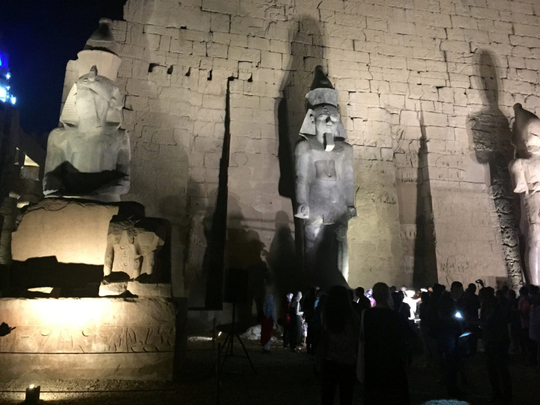
Luxor: Egypt has unveiled a massive granite statue of Ramses II, the most powerful and celebrated of the ancient Pharaohs, after completing its restoration.
Standing 11 metres tall and weighing 75 tonnes, the statue was presented in a floodlit ceremony at the Luxor Temple on the banks of the Nile on Tuesday evening. When the statue was discovered between 1958 and 1960, it was in 57 pieces.
Ramses II, also known as Ramses the Great or Ozymandias, reigned more than 3,000 years ago. He led several military expeditions and expanded the Egyptian Empire to stretch from Syria in the north to Nubia in the south.
The statue was displayed just hours after archaeologists unveiled the tomb of a nobleman from more than 3,000 years ago, the latest in a series of discoveries that Egypt hopes will revive a tourist business hit by political instability.
“What we’re happy with is that (the kind of tourists drawn to) classical Egypt, Luxor, Aswan, Nile cruises ... are back to normal levels again,” said Hisham El Demery, chief of Egypt’s Tourism Development Authority.
The find near the Nile city of Luxor, is the tomb of Userhat, a judge from the New Kingdom. It consists of an open court leading into a rectangular hall, a corridor and inner chamber, the Ministry of Antiquities said on Tuesday.
In one of the rooms in the tomb, archaeologists found a collection of figurines, wooden masks and a handle of a sarcophagus lid. Excavation is continuing in a second chamber.
Earlier this year, Swedish archaeologists discovered 12 ancient Egyptian cemeteries near the southern city of Aswan that date back almost 3,500 years.
In March, Egypt unearthed an eight-meter statue in a Cairo slum that is believed to be King Psammetich 1, who ruled from 664 to 610 BC.
Hisham El Demery, chief of Egypt’s Tourism Development Authority, said tourism was picking up and discoveries like the one at Luxor would encourage the sector.












